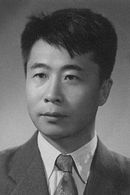Qu Bo, a renowned Chinese novelist, was born with a family name that symbolized curve, melody, and tune, while his given name, Bo, represented ripples and waves. His literary journey began with the publication of his first book, Tracks in the Snowy Forest (Lin Hai Xue Yuan),which catapulted him to fame and solidified his position as one of the most popular authors of his time.
Qu Bo's early life was marked by humble beginnings, growing up in Zaolinzhuang Village, Huang County, Shandong province, where he received his initial education at a private school. It was during this period that he developed a profound understanding of Chinese classical literature and honed his language skills.
Tragedy struck when his family's small business, a cotton dyeing operation, failed due to the influx of western textiles into China. This setback led to Qu Bo's decision to leave home at the tender age of 15 to fight against the Japanese invasion in the Second Sino-Japanese War. He was later rechristened Qu Bo by the officials of the Eighth Route Army, abandoning his childhood name Qu Qingtao.
Qu Bo's educational pursuits continued at the Counter-Japanese Military and Political University in Shandong, where he gained further knowledge and skills. He went on to become a journalist for an army newspaper, The Progress, before the army transformed into the People's Liberation Army following Japan's surrender.
Qu Bo continued to serve in the army, taking on various roles, including that of a young literacy teacher, political commissar, and finally, a colonel. During this period, he married Liu Bo, a head nurse at the same army regional headquarters.
After the communist regime took power in 1949, Qu Bo transitioned to a career in the railway industry and the Ministry of Machinery, where he worked until his retirement. He spent the remainder of his life in Beijing, remaining an active member of the China Writers' Association and a prominent figure in Chinese literature.
Qu Bo's literary endeavors were a testament to his dedication, as he continued to write books and articles despite holding full-time industrial management positions. His travels took him to Russia, Pakistan, and England, where he was received as both an author and industrial director. His novels were adapted into films, Beijing Opera musicals, and television shows, cementing his legacy as a Chinese contemporary writer.


















